Dissident Filmmakers Visit Newly Released Iranian Rapper
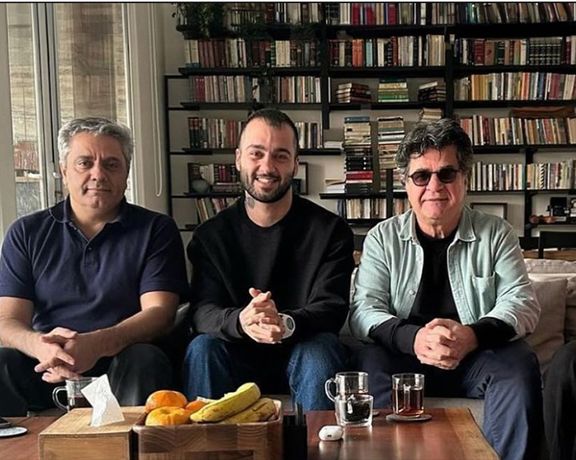
Prominent filmmakers Jafar Panahi and Mohammad Rasoulof met Iranian rapper Toomaj Salehi after his release from prison over supporting anti-government protests.

Prominent filmmakers Jafar Panahi and Mohammad Rasoulof met Iranian rapper Toomaj Salehi after his release from prison over supporting anti-government protests.
Prominent filmmakers Jafar Panahi and Mohammad Rasoulof met Iranian rapper Toomaj Salehi after his release from prison over supporting anti-government protests.
The 33-year-old rapper is known for his protest songs directly criticizing the Iranian regime. He was arrested in October 2022 amid an intensified crackdown by the Islamic Republic on opposition figures, following the nationwide Woman, Life, Freedom protests, ignited by the death in custody of Mahsa Amini.
After a year in prison, including 252 days in solitary confinement, Toomaj Salehi was released on bail on November 19.The award-winning filmmakers have also been free on bail since February.
Panahi was imprisoned early in July 2022 following a visit to the Evin prison to inquire about the whereabouts of Rasoulof, who was arrested the previous day.
Prior to the "Woman, Life, Freedom" protests, Rasoulof was imprisoned after signing a petition calling for the Iranian security forces to cease their violent attacks on demonstrators in Abadan, southwest Iran.
Last spring, hundreds of residents of Abadan, the capital of Khuzestan in the southwest of Iran, took to the streets to protest the fatal collapse of an unfinished building. Their demands included the prosecution of those responsible for the accident, including the mayor and members of the city council.
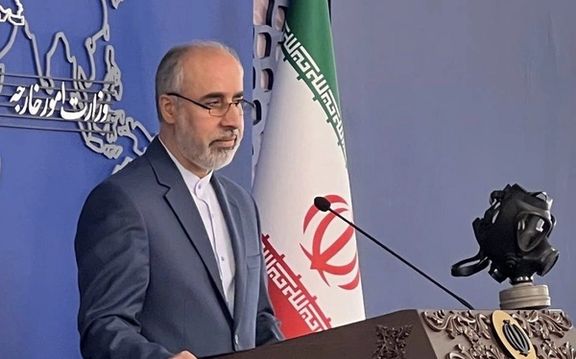
Iran’s Foreign Ministry spokesman has condemned the European Parliament's resolution on human rights breaches in Iran, calling it “meddlesome” and "anti-Iranian".
Nasser Kanaani, in a statement released on Friday, said the resolution approved by the European Parliament reveals “the confusion of some European parties regarding the reality of the Islamic Republic.”
European Parliamentarians adopted a resolution condemning the deterioration of human rights in Iran on Thursday.
As part of the resolution, European Parliament members called on the Iranian authorities to end immediately all discrimination against women and girls, including mandatory veiling, and to retract all laws discriminating against women and girls
The European Parliament members (MEPs) also urged the regime to release “victims of arbitrary detention and human rights defenders” such as Narges Mohammadi, Sepideh Gholian, Golrokh Iraee, Nasrin Javadi and Bahareh Hedayat.
Moreover, their demands included the immediate release of Iranians with dual citizenship and non-Iranians, such as Johan Floderus, Ahmadreza Djalali, Nahid Taghavi, Jamshid Sharmahd, and Massoud Mossaheb.
Finally, the resolution echoed the calls to designate the Islamic Revolutionary Guard Corps (IRGC) as a terrorist organization and to sanction the President, the Supreme Leader and the Prosecutor-General for their human rights violations.
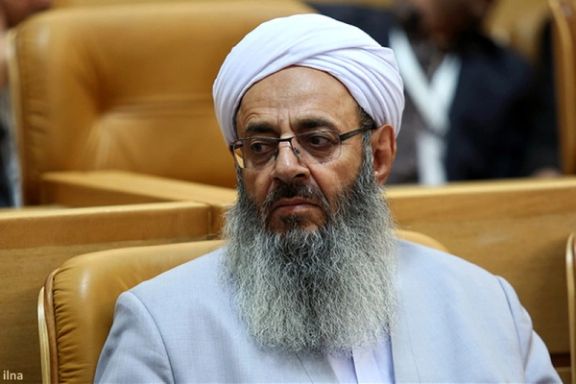
Outspoken Iranian Sunni leader Mowlavi Abdolhamid has stated that regime forces have shut down a number of Sunni prayer rooms in Mashhad and Tehran.
In a sermon delivered at the Friday prayer service in the Sunni-majority city of Zahedan in the southeast, Abdolhamid said the prayer rooms were "trouble-free", and "nothing was said against" the Shiite clerical government.
Since Mahsa Amini's death in mid-September 2022 and the nationwide uprising that followed, Zahedan has become the epicenter of protests against the Islamic Republic.
In recent weeks, tensions have increased between the Sunni Baluch minority in the region and Islamic Republic authorities.
As reported last week, security and law enforcement forces and "armored bulletproof military vehicles” were deployed at some crossing points in the Sistan-Baluchistan province before the weekly Friday sermon of Mowlavi Abdolhamid.
Currently, Iranian authorities are being criticized for failing to punish those responsible for Zahedan's 'Bloody Friday' on September 30, 2022, when security forces fired at protesters.
It is estimated that nearly 100 civilians, including women and children, were killed in Zahedan, the capital of Sistan-Baluchistan province, when they peacefully protested against the government.
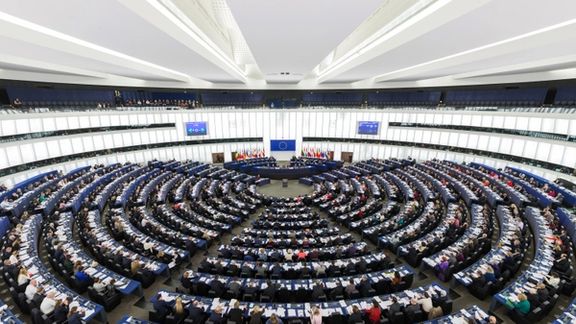
The European Parliament has condemned the deterioration of the human rights situation in Iran and urged the release of arbitrarily detained activists and foreign nationals.
“Parliament strongly condemns the deterioration of the human rights situation in Iran, and the brutal murders of women by the Iranian authorities, including the 2023 Sakharov Prize laureate Jina Mahsa Amini,” a resolution adopted Thursday by European lawmakers by 516 votes in favor, 4 against, and 27 abstentions said.
Members of the European Parliament also urged the Iranian authorities to immediately end “all discrimination against women and girls, including mandatory veiling, and to withdraw all gender discriminatory laws.”
Arbitrary detention, withholding medical treatment to prisoners, police violence, torture, capital punishment, and the alarming rise in the number of executions was also “strongly condemned” by the European Parliament.
The resolution demanded the immediate release of all victims of arbitrary detention and human rights defenders, including Nobel Peace Laureate Narges Mohammadi, political activist Sepideh Gholian (Qoliyan), women’s right activist Golrokh Iraee, labor activist Nasrin Javadi and political activist Bahareh Hedayat all of whom are held at Tehran’s Evin Prison.
The European Union needs to launch a strategy to counter the Islamic Republic’s “hostage diplomacy”, the resolution said and demanded the immediate and unconditional releases of several EU citizens held in Iran including a Swedish EU diplomat and an elderly Austrian.
What has come to be known as the Islamic Republic’s hostage diplomacy involves the arbitrary arrest of foreign nationals and dual citizens to use them as bargaining chips in dealings with western countries.
Johan Floderus, a young Swedish EU diplomat, for instance, was arrested at Tehran airport in April 2022 after what was described as a private tourist trip with friends.
Iranian authorities have accused Floderus who is also being held at Evin Prison since then of espionage, a charge they often use to justify the arrest of foreigners and dual nationals.
Iran is also holding a Swedish-Iranian doctor, Ahmadreza Djalali (Jalali). Djalali who was arrested in 2016 during an academic visit to Iran was sentenced to death in October 2017 on charge of espionage for Israel.
In April 2022 Iran tried to ramp up pressure on Sweden to free Hamid Nouri who Sweden had put on trial over the mass execution and torture of political prisoners in July and August 1988, by threatening to execute Djalali. Nouri is currently serving a life sentence in Sweden.
The 73-year-old Austrian-Iranian businessman, Massud Mossaheb who is serving a 10-year prison term for vague national security offences is another EU citizen Iran has been holding since 2019.
Despite poor health prior to his imprisonment which required regular specialist medical treatment, Mossaheb has been denied access to adequate medical care and to specialist medical professionals outside prison.
Members of the European Parliament reiterated their call in their resolution for the initiation of criminal investigations into “crimes committed by the Iranian authorities under universal jurisdiction” while demanding designation of the Revolutionary Guards (IRGC) as a terrorist organization and sanctions against human rights violators in Iran. These include Supreme Leader Ali Khamenei and President Ebrahim Raisi.
The European Parliament also urged the European External Action Service and member states to support the Iranian Sakharov and Nobel Prize laureates.
Prominent lawyer Nasrin Sotoudeh and dissident filmmaker Jafar Panahi jointly won the European Parliament’s Sakharov Prize in 2012. Both have been prosecuted, imprisoned, and banned from leaving the country on charges such as “assembly and collusion [to overthrow the regime]” and propaganda against the Islamic Republic.
Prominent human rights defender Narges Mohammadi won the Nobel Peace Prize in October this year while in prison "for her fight against the oppression of women in Iran and her fight to promote human rights and freedom for all.”
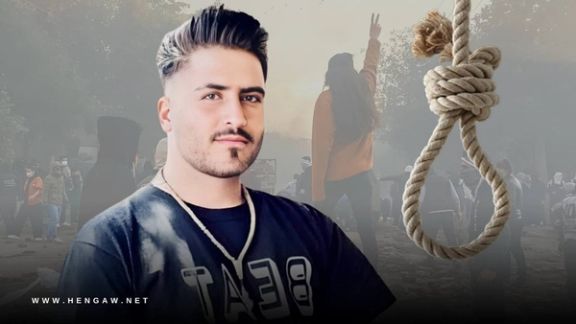
The execution of Milad Zohrevand, a young Iranian protester on Thursday, has shocked and angered anti-government activists and dissidents in Iran and abroad.
Zohrevand was secretly executed in the Malayer prison in the western province of Hamedan while his family were not allowed to see him for one last time. Hengaw Human Rights Organization said in a statement that Zohrevand had not been notified that his execution.
The 21-year-old was married and became a father while serving time in prison. It is not clear if he ever had the opportunity to see his newborn child before his death.
In June, Zohrevand was sentenced to death in connection with the “murder” of an IRGC officer named Ali Nazari during the nationwide uprising against the Islamic Republic. Zohrevand was arrested by security forces on October 26, 2022, at the height of the anti-regime protest movement, triggered by Mahsa Amini’s death in the custody of the hijab police.
Gohar Eshghi, the mother of the 35-year-old blogger Sattar Beheshti, who was killed under torture in Evin prison 11 years ago, released a video message after the Zohrevand’s execution.
"You're right; you start working at five in the morning. At the time of the call to morning prayer, you execute the youth or kill them under torture," Eshghi said in the video, addressing Supreme Leader Ali Khamenei, “do not kill these young people."
Executions take place around the time of Muslim dawn prayer in Iran.The time for the call for dawn prayer (called azan or adhan) is now associated with executions for Iranians.
Despite the claims made by the Iranian judiciary, no video has been released so far showing how the IRGC officer was killed. According to human rights activists and organizations, there are many contradictions in the charges levelled against Zohrevand.
Iran’s judiciary and security officials provided different and even contradictory data regarding the number of suspects that were arrested in relation to the “murder” of the IRGC officer.
Zohrevand was reportedly accused by prosecutors of being one of a group of five masked men who shot the IRGC intelligence agent as he confronted students demonstrating at the Malayer Faculty of Medical Sciences in October 2022.
Information received by Iran International indicates that Zohrevand was denied access to a lawyer and other basic rights of an accused throughout his detention. His family was also under intense pressure from the IRGC intelligence service not to make public statements about his case.
The execution comes two weeks after UN Secretary-General Antonio Guterres released a report highlighting a surge in executions in Iran.
According to the report, at least 419 people were executed, including 409 men and 10 women, between January 1, 2023 and July 31, 2023, marking a 30 percent increase compared to the same period last year. Iran is second only to China in the number of executions carried out annually.
At least eight people have been executed by the Iranian regime for their involvement in nationwide protests triggered by the death in custody of Mahsa Amini in September 2022.
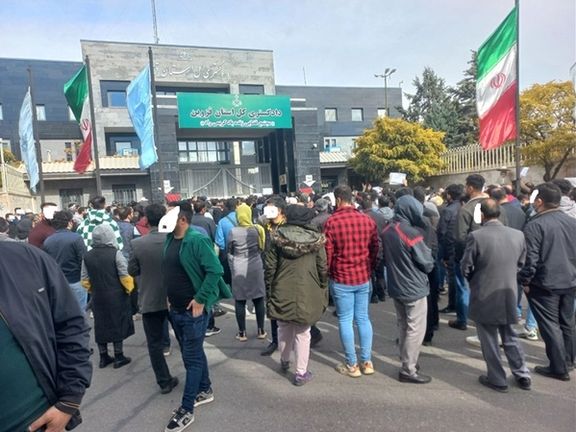
In a tense confrontation, security forces attacked a gathering of individuals who lost their money to the fraud of Rezayat Khodro Taravat Novin, a vehicle leasing company in Qazvin, west of Tehran.
The incident happened on Thursday when victims gathered in front of the governor's office in Qazvin, expressing their grievances over financial losses incurred at the hands of the company.
The victims claim the company embezzled a staggering 300 trillion rials (approximately $600 billion) through schemes for pre-selling cars. For several months, hundreds of people have been staging protests in Tehran, Qazvin, and Takestan, demanding justice and restitution. The nationwide fraud involves at least 38,000 people.
Recent videos show security forces using teargas and water cannons against the protesters. Government forces on several occasions attacked the protests by the victims.
Over the past three months, the Qazvin judiciary has detained managers from Rezayat Khodro Taravat Novin, announcing that all assets belonging to the company's CEOs will be seized.
Mohammadreza Ghaffari, the owner of the company, reportedly moved a portion of the capital abroad. The judiciary says the victims' gatherings are illegal, citing concerns about disturbances in public order.